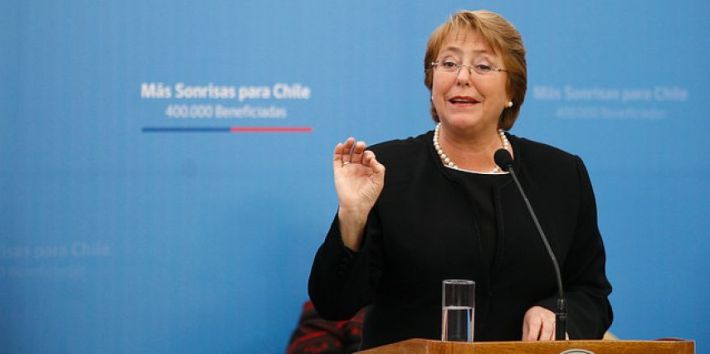
EspañolIt appears that the public image of Chilean President Michelle Bachelet is in recovery mode, even if a considerable majority of Chileans still regard her unfavorably. According to the GFK Adimark polling firm, her favorability rating has increased from 25 percent to 29 percent, while her negative image fell from 70 percent to 67 percent.
While Bachelet’s popularity has risen slightly, her education and labor reforms, two of her administration’s flagships, have also seen an increase in support. In the last month, approval for the government’s education reform increased from 37 percent to 44 percent, while the labor reform rose six points to 38 percent. Is this coincidence or causality?
Unfortunately, the data offers no qualitative aspects of people’s opinion. When pollsters don’t ask anything beyond a policy’s level of approval or rejection, no conclusion can be certain. Do people, for instance, disagree with the reform because they regard it as immoral or inefficient? Or do they disagree because they believe it doesn’t go far enough?
The only tentative conclusion is that President Bachelet’s growing popularity and her reforms’ growing public approval may be related. But if this is indeed the case, it’s important to ask: on what grounds? Do people want deeper reforms or not?
Recent Chilean media headlines can provide some clues: 739 government-subsidized schools will be completely “free of charge” in 2016; the government has announced that US$252 million will be assigned to education in order to guarantee gratuity; Bachelet’s secretary general says that the education reforms are “ambitious”; businesses will not be allowed to hire internal replacements for striking workers; and business association Sosofa believes that a proposed labor reform is inconvenient for the country.
[adrotate group=”8″]
In general terms, the government’s message is that its reforms and its “realism without resignation” agenda will continue. All Bachelet’s spokesmen are in line, except for Minister of the Economy Rodrigo Valdés, whose realism seems genuine, which is perhaps why his approval ratings have started to slide.
So President Bachelet’s approval ratings and reforms seem to dance to the same tune. But, still, why do a majority of Chileans reject both the president and her reforms?
If citizens reject both Bachelet and her statist plans outright, then there’s hope that a future government will implement pro-market policies and attract investment to Chile again. If, on the other hand, Chileans believe that the government is not sufficiently statist, then uncertainty will continue to scare away investors, to aggravate the worrying fiscal deficit, and to threaten the labor market.
 Versión Español
Versión Español












